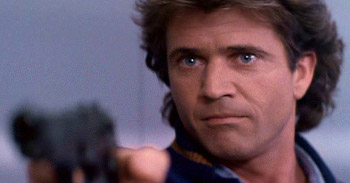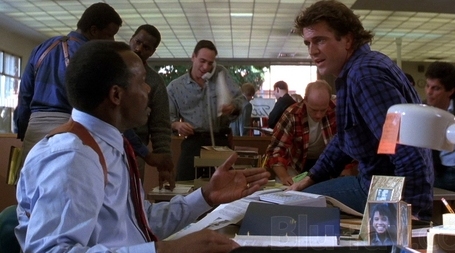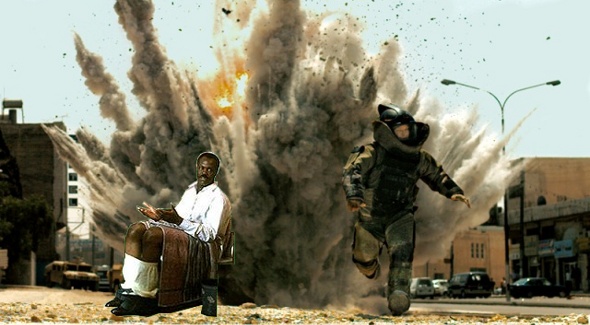Psychology vs. psycho-pharmacology

This is my crazy face.
This is actually what made me really want to write this post, because the similarities between Lethal Weapon and The Hurt Locker let you draw a really interesting through-line in the last 20 years in public attitudes toward mental illness, and, in turn, toward the larger ideas of biopower that serve as the controlling strategies for a lot of the overriding social order.
Sgt. Riggs (Mel Gibson) and Sgt. James (Jeremy Renner) are, for the purposes of cultural criticism, largely the same character. They are crazy, borderline suicidal virtuosos who, having left behind most of the rest of what’s in their lives, only have their jobs left. Observe this scene from Lethal Weapon:
http://www.youtube.com/watch?v=tOqpoie1iuc&NR=1
Now, I won’t belabor the similarities between this and certain scenes in The Hurt Locker – if you’ve seen the movie, you’ll notice them. But I will point out that it acknowledges a pathology. Sgt. Riggs is sick, he has suicidal manic depression. He is obsessed with his job as the only thing in his life that he cares about. Being a supercop is like an illness, it comes from an unhealthy place.
(You can actually tell a lot about a movie by what unhealthiness creates its supercops.)
Throughout the Lethal Weapon movies, Riggs’ craziness is explored in an 80s- and 90s-friendly therapeutic way. By opening up about his feelings, he feels more normal and he starts getting over his problems. He takes control of his life (of course, this is about where a random bad guy kills the girl and he goes out for vengeance, but I digress).
The main point is that Mel Gibson has psychological problems, and he talks about them. Society regains control of him by modeling an idea of mental illness that includes the necessity of him going into therapy of a formal or informal nature – and by acknowledging his own illness and talking about it, he rejoins society and the social order is restored.
Compare this with Jeremy Renner’s mental illness in The Hurt Locker. The epigraph of the movie states that “War is a drug.” Now, I’ve heard it said and seen it written that this is the lesson of the movie – well, if it is, it’s a surface lesson, speaking to an earlier, common ancestor. Jeremy Renner’s character isn’t that different from Mel Gibson’s character, but the pathological metaphor for him is different, reflecting, I think, the different way we look at mental illness now.
See, while Mel Gibson’s character has pent up emotions and needs to talk about his problems to stop being crazy, Jeremy Renner is addicted to war. His problem is chemical. Talking about it doesn’t make it better, he just needs his fix.
Both movies, like all buddy cop movies, are about unmet needs – the “crazy one” is the man with an unmet need, and the “buddy” is the fantasy that helps that man act out his fantasies and get what he needs. As I’ve said before on this site, buddy cop movies are a lot like romantic comedies, they’re fantasies about people trying to fill their unmet needs with relationships (which is one reason why so many romantic relationships in movies are awful and codependent and not good models at all for how to conduct one’s own relationships – because good plotting requires your characters to “need” something from close to the beginning of the movie, which places an unhealthy burden on most movie couples).

Tell me more. This is an interesting subject. Also, sit on my lap.
But in contemporary ideas of biopower and the treatment of mental illness, conventional therapy has been — perhaps unfortunately, and many people would dispute this — discredited as a way of dealing with these problems, displaced by psychoactive medication. 1987, the year Lethal Weapon came out, was also ironically the year the FDA approved the barrier-breaking antidepressant drug Prozac (Fluoxetine) for use in the United States.
And while there is some building backlash against the overuse of Ritalin or other psychoactive drugs that may or may not be abusively foisted on people for the best interests of corporations rather than the individuals themselves (I’m looking in your general direction, Zyprexa), it is a backlash against a status quo in which they are used – and boy are they used.
We live in a world where 5-hour energy shots have replaced truck-stop coffee, where tomatoes are marketed as a cancer-treating medication rather than a food, where bread is labeled as having 0g of trans fat, where sports and entertainment are dominated and obsessed by drugs, drugs drugs.
Saying that War is a Drug is not a new insight – it’s a re-contextualization of an old problem. It places the problems of war within the framework of explanation and control of our drug-obsessed culture. The notion is that because so much of our collective understanding flows through the symbolism and vocabulary of drugs, that by using this vocabulary, we can come to a new understanding about war and the madness that accompanies it.
But it’s us, not the madness, not the violence, that has changed. Riggs had the same thing, and nobody was saying Riggs was on drugs – even though he acts coked out all the time. Look at the previously linked scene with the drug deal – you can tell that the politics and social mores of the time would not have allowed Riggs to actually take the drugs. No, drugs and madness were separate moral centers of gravity – drugs for corruption, madness for self-destruction. For the old school D&D fan – in the 80s, drugs were chaotic evil, madness was chaotic neutral. Whereas now, alignment doesn’t work the same way, and drugs and madness are just in some chic, morose vampire thing or something.
The most interesting differences between the Lethal Weapon series and The Hurt Locker are how the different ways the film as a whole contextualizes the play of the characters and actors tells us how attitudes have changed over time. We can see 20 years in the history of our stock characters go by in an instant.
Riggs’s relationship with his daughter vs. James’s with his son shows you 20 years in changing family dynamics. Sanborn’s relative authority and confidence in dealing with his partner and superiors tell you something about evolving race relations (and how they haven’t evolved). The difference between Leo Getz and Specialist Eldridge raises the dual burning questions of why Joe Pesci is in any movies at all vs. why Joe Pesci isn’t put in every movie ever made. I don’t know which question to ask, let alone the answer.
What points of cultural resonance did you find in the two movies? If you haven’t seen The Hurt Locker, does this make you want to see it more or less? Sound off in the …
.. Ugh …
.. comments!

I’m glad to have read this before Oscars night. Now, I no longer have to root for this movie to destroy Avatar. Now, I am completely indifferent to the whole process, much like my views on politics! fenzel, you’ve saved me from caring, which in its own way is one of the greatest gifts imaginable.
Addendum to your post- that staff psychologist, you know the one… he’s the same head shrink character from Lethal Weapon! They have a psychologist following around the team in both movies, for crying out loud!
Wow, this is weird. Carlos had this exact idea for an OTI piece but never got around to writing it. I guess The Hurt Locker really IS Lethal Weapon! (This is also how my dad refers to this movie.)
Also: While I wouldn’t say The Hurt Locker is a bad film, it clearly doesn’t deserve all the praise it’s getting. There. I said it so you don’t have to.
It is interesting to see the difference in the way Hollywood deals with madness. It seems that too often they take the view that one needs to just talk about it with a friend and suddenly its all betters. Having several good friends with some mental health problems, I can tell you that constant anxiety or depression don’t just go away because you get hugs. Sure, it helps, but I think since Lethal Weapon, people have come to recognize that there a physical nature for our moods and personalities, namely the neurotransmitters zooming around in our heads, sometimes developing in ways that aren’t our fault. I felt like some movies like Girl, Interrupted were shouting at some people to not be so sad all the time, to just suck it up, talk it out, and get over it. But can there really be mind over matter, when you mind fundamentally IS matter?
@mlawski and @fenzel: I think The Hurt Locker is getting all the praise it deserves. Possibly it deserves more. And yet I agree with Fenzel’s ultimate take – that by presenting the elements of a buddy cop film in a stylized, minimalist and serious way, The Hurt Locker gets more respect than earlier movies that have tread the same ground.
One could make the same case about several other critical darlings – No Country For Old Men vs. blaxploitation cinema, or There Will Be Blood vs. Dallas.
I think we can fill out the account of why “just entertainment” is such a crock, though this particular line of inquiry is not really germane to the point you’re trying to make. Not directly, anyway.
Even more often than it’s deployed by critics or diletantes to dismiss something they deem unworthy of consideration, it’s deployed by normal viewers (that is to say, viewers without any skin in the art-making game) to excuse the guilt they feel for preferring movies that aren’t preachy or generally considered “good for you.”
I think it’s a tragedy that we have to apologize for our pleasures, especially when the pleasure in question is a good story well told.
Just lost my comment to the void, but here’s the short version:
The Hurt Locker is clearly a well-made movie, and my problems with it are somewhat personal. I’m just over this type of character — see my comments on Stokes’s Overthinking Cowboy Bebop articles to see how much I want to slap Spike Spiegel across the face. At the risk of sounding political, the Renner character is so typically “American” — ooh, manly-man rugged individualist who is SO GOOD at his job that he can get away with being an asshole sociopath who gets everyone around him killed because he’s too much of a Real Man to work with others or seek psychological help to get over his death wish. It wouldn’t bother me so much if these types of characters weren’t always presented as super-cool anti-heroes instead of the nutjobs they so obviously are. It’s an action-adventure fantasy, that’s all.
Also(and maybe I shouldn’t get into this argument again), although I love many things that fall into the “just entertainment” category, can’t we agree at a certain point that Macbeth is better in some ways than Die Hard? (For the record, I love Die Hard, and I think Macbeth is incredibly entertaining.) Or, on the TV front, can’t we all agree that The Wire, which is both entertaining and “Important,” is in some ways superior to the best episodes of Burn Notice, which are incredibly entertaining but the polar opposite of “Important”?
@shana,
Well, MacBeth is just a script. Die Hard is a whole production. So you’d have to judge an entire production of MacBeth against Die Hard. I’ve seen a couple of movie and live productions of MacBeth, and while the script is better than the Die Hard script for a bunch of reasons, the productions were generally not as good as Die Hard.
I would say that if you want to point to the Wire being better than Burn Notice, you could find justifiable reasons to claim it, but I would caution against relying on its “importance.” The Wire does a lot of awesome things other than just be “important.” It isn’t just a bad history of Baltimore – it has a lot of artistry. Now, I haven’t seen Burn Notice, so I can’t make comparisons there, but I could do a pretty detailed comparison of The Wire and The Sheild that didn’t include at all whether one show was more “important” than the other.
I think using legitimacy or seriousness as the main criteria for quality is reductive. You don’t have to rely on it. Shakespeare certainly didn’t — his plays are funny, his characters are compelling and vivacious, and he’s not above telling dirty jokes. He didn’t have the luxury of patting himself on the back for being important, because Shakespeare made art people actually watched for a living and didn’t rely on criticial approval for his professional reward and fulfillment.
Maybe this comes from reading English literary criticism from over the centuries — watching a particular poet fall in and out of favor based on the intellectual fashion of the time. So much of the approval or legitimacy of the academy (or Academy, ‘natch) is just fashion — what people happen to think is important, what advances their own goals for themselves and their art form.
So, no, I’m not willing to concede that, say, Pilgrim’s Progress is better than Harold and Kumar go to White Castle, just because one of them is Worthy and Important the other one is contemporary, market-driven popular entertainment.
I agree with you on The Hurt Locker, by the way. The original article had a few more paragraphs bashing it, but they weren’t well thought out or necessary, and they were too relative to be worth pubilshing. The Hurt Locker is a very good movie that deserves praise, it’s more a matter of whether it deserves as much praise as it is getting or not — and at that point that’s kind of irrelevant; we have to see whether it wins the big Oscars or not, because I’m not sure everybody is on the same page about how much this movie is actually being praised. A lot of that is speculation about buzz. So, we’ll see how it turns out in the end.
@fenzel and the rest: Your comment makes a lot of sense. The fact is, I keep going back and forth on the “how do we judge art?” question. I’ve spent many hours of my life arguing that, yes, Jack Black’s Year One is just as much “art” as Hamlet. Art criticism is probably more subjective than any field on Earth, so it’s easy to make these kinds of arguments.
But I still don’t know. Part of me really wants to say, “Yes, definitively, 12 Angry Men is superior to The Blind Side, and anyone who disagrees is a big stupid.” And it’s not just because 12 Angry Men has superior acting or a tighter script — it’s because 12 Angry Men is ABOUT something and The Blind Side is just a series of Lifetime movie cliches. Why should movies be about something? I’m not saying that they have to be heavy-handed and preachy. I’m just saying that maybe those films that actually illuminate a truth about our real, lived lives are automatically a step up from films that operate in fantasy Hollywood-land. (And, no, this isn’t about genre: a piece of fantasy fiction like Pan’s Labyrinth can be considered more “true to life” than a theoretically “realistic” film like Valentine’s Day.)
Another problem with Macbeth: No Alan Rickman. Although Alan Rickman playing Macbeth in a movie version is definitely something I could get behind.
I think separating these two is more than just contextualizing. I don’t actually believe that “war is a drug” is a major thesis point of the film , I think its about much more than that, but that’s not what the topic is about so I’ll skip it.
Something my room mate mentioned was that the big thing for the Hurt Locker can be viewed through O’Brian’s The Things They Carried; which is not exactly entirely accurate about Vietnam, but is a metaphor that conveys the experiential truth of that conflict, the Hurt Locker is very similar. It shows a metaphor inside a certain context; whereas Lethal Weapon is a specific story entailing certain features. The Hurt Locker is too, to a certain degree but the difference my room mate discerned is that Lethal Weapon’s story is intrinsic whereas the Hurt Locker’s episodic nature was inherent not to describing the story but to describing certain features about the characters and the conflict. The Lethal Weapon is specifically structural whereas the Hurt Locker is more deconstructionist.
I think what separates The Hurt Locker from something like Generation Kill (the series form a book literally based on true events from the onset of the war) is that while the prior is hyper-realistic and the other is just realistic (because it is very close to the original source material just off form the actual events) is that the metaphor in the Hurt Locker is to convey an idea but that Generation Kill is to convey something that occurred and to show the “truth” in that thing, rather than the “idea” of Hurt Locker.
You’ve said a lot of interesting things here but ultimately I don’t think the similarity argument works. For me the part where the comparison really breaks down is this: Riggs is the classic Broken Hero, who’s aberrant behavior stems from some damage in his past, usually a loss, sometimes coupled with previously questionable behavior of his own. A Broken Hero is ultimately saved/redeemed by connection to a person or people around him. James’s aberrant behavior and his damage are pretty much one and the same and it’s made quite clear that any connections he might have to other people in his life are not going to make any difference.